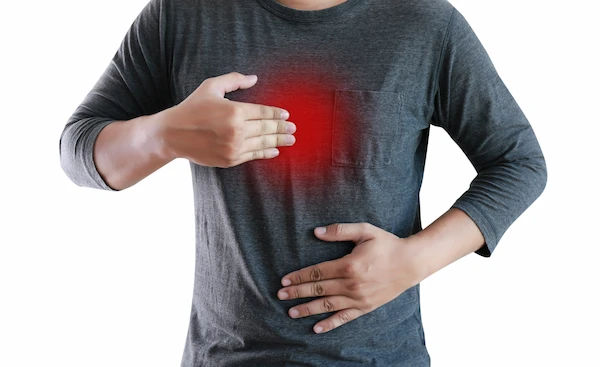Understanding GERD Symptoms, Causes and Treatments
Discover GERD (Gastroesophageal Reflux Disease) symptoms, causes, and treatment options. Learn how acid reflux affects daily life, available management strategies, and when to seek medical help.

Written by Dr. Rohinipriyanka Pondugula
Reviewed by Dr. Md Yusuf Shareef MBBS
Last updated on 13th Jan, 2026

Introduction
Gastroesophageal Reflux Disease (GERD) or Gastro-oesophageal Reflux Disease (GORD) is a common digestive disorder that affects millions of people worldwide. If you frequently experience heartburn, acid reflux, or discomfort after eating, you might be dealing with GERD. This article will help you understand what GERD is, its symptoms, causes, and available treatments, all explained in simple, easy-to-understand language.
What is GERD?
GERD occurs when stomach acid frequently flows back into the oesophagus (the tube connecting your mouth and stomach). This backwash (acid reflux) can irritate the lining of your oesophagus, leading to discomfort and potential complications if left untreated.
While occasional acid reflux is normal, experiencing it more than twice a week may indicate GERD.
Consult a Gastroenterologist for the best advice
Common Symptoms of GERD
GERD can cause a variety of symptoms, some of which may be mistaken for other conditions. The most common signs include:
Heartburn: A burning sensation in the chest, often after eating, which may worsen at night.
Regurgitation: A sour or bitter-tasting acid backing up into your throat or mouth.
Difficulty swallowing (Dysphagia): Feeling like food is stuck in your throat.
Chronic cough or hoarseness: Persistent irritation in the throat due to acid reflux.
Chest pain: Sometimes mistaken for a heart attack (seek immediate medical help if chest pain is severe).
Nausea or vomiting: Especially after meals.
If you experience these symptoms frequently, it’s important to consult a doctor for proper diagnosis and treatment.
What Causes GERD?
GERD happens when the lower esophageal sphincter (LES), a muscle ring that acts as a valve between the oesophagus and stomach, weakens or relaxes abnormally. This allows stomach acid to flow backward. Several factors can contribute to this condition:
Dietary habits: Eating large meals, fatty or spicy foods, chocolate, caffeine, or acidic foods (like citrus and tomatoes).
Lifestyle factors: Smoking, alcohol consumption, obesity, and lying down immediately after eating.
Pregnancy: Hormonal changes and pressure on the stomach can trigger reflux.
Hiatal hernia: A condition where part of the stomach pushes up into the diaphragm, weakening the LES.
Certain medications: Some pain relievers, blood pressure medications, and sedatives may worsen reflux.
How GERD Affects Your Health
If left untreated, GERD can lead to complications such as:
Oesophagitis: Inflammation and damage to the oesophagus lining.
Oesophageal strictures: Narrowing of the oesophagus due to scar tissue, making swallowing difficult.
Barrett’s oesophagus: A precancerous condition where the oesophageal lining changes, increasing the risk of oesophageal cancer.
Early diagnosis and management can prevent these complications.
Managing GERD: Lifestyle and Dietary Changes
While medications can help, lifestyle modifications play a crucial role in controlling GERD symptoms. Here are some practical tips:
Dietary Adjustments
Avoid trigger foods: Spicy, fatty, fried, and acidic foods can worsen reflux.
Eat smaller, frequent meals: Large meals increase stomach pressure.
Limit caffeine and alcohol: Both can relax the LES and trigger reflux.
Stay upright after meals: Wait at least 2-3 hours before lying down.
Lifestyle Changes
Maintain a healthy weight: Excess weight puts pressure on the stomach.
Quit smoking: Smoking weakens the LES.
Elevate your head while sleeping: Use a wedge pillow to prevent nighttime reflux.
Wear loose clothing: Tight belts or waistbands can increase abdominal pressure.
Medical Treatments for GERD
If lifestyle changes aren’t enough, your doctor may recommend:
Antacids: Provide quick relief by neutralizing stomach acid (e.g., Tums, Rolaids).
H2 Blockers: Reduce acid production (e.g., Ranitidine, Famotidine).
Proton Pump Inhibitors (PPIs): Stronger acid reducers (e.g., Omeprazole, Pantoprazole).
Surgery: In severe cases, procedures like fundoplication may be needed to strengthen the LES.
When to See a Doctor
Consult a healthcare provider if:
Symptoms persist despite lifestyle changes.
You experience difficulty swallowing or unintended weight loss.
You have severe chest pain or vomiting blood (seek emergency care).
Final Thoughts
GERD is a manageable condition with the right approach. By making simple dietary and lifestyle changes and seeking medical advice when needed, you can reduce discomfort and prevent complications. If you’re struggling with persistent acid reflux, don’t ignore it; take action today for better digestive health!
Consult a Gastroenterologist for the best advice
Consult a Gastroenterologist for the best advice

Dr Bhargav Vuppumalla
General Physician/ Internal Medicine Specialist
5 Years • MBBS MD GENERAL MEDICINE
Bengaluru
Apollo Medical Center, Marathahalli, Bengaluru

Dr Harish K C
Gastroenterology/gi Medicine Specialist
15 Years • MBBS MD DM MRCP(UK) (SCE-Gastroenterology and Hepatology)
Bengaluru
Apollo Hospitals Bannerghatta Road, Bengaluru

Dr Rohit Sureka
Gastroenterology/gi Medicine Specialist
15 Years • MBBS, DNB General Medicine, DNB Gastroenterology
Jaipur
Apollo 247 virtual - Rajasthan, Jaipur

Dr. Paramesh K N
Gastroenterology/gi Medicine Specialist
16 Years • MBBS, MS ( General Surgery), DNB ( Surgical Gastroenterology)
Hyderabad
Sprint Diagnostics Centre, Hyderabad

Dr. Shivaraj Afzalpurkar
Gastroenterology/gi Medicine Specialist
13 Years • MBBS, MD General medicine (Gold medalist), DrNB (Gastroenterology), MNAMS
Bengaluru
Apollo Clinic, JP nagar, Bengaluru


